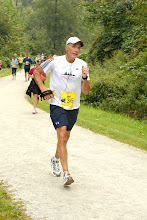“Let pain be your guide.” Who first said that anyway? Was it Jesus or the Buddha or Mohammed? Or was it from a Bruce Lee movie? That expression might reveal a deep insight to some, yet I could also understand how it might sound like shallow psycho-babble to others.
I have been turning this expression around in my head for about a week since it was directed to me by an intern in orthopedic medicine. I don’t know if that intern had memorized this expression from a classroom lecture entitled: “The kinds of things to say to people recovering from surgery” or if he has experienced them as words to live by in his own life.
Of course, I immediately thought of the many coaches I have had over the years who loved to say: “No pain, no gain.” I think this was meant to be either motivation for us to do stupid things to prove our dedication to the sport or justification for their cruel drills such as the one called “Blood Board” that we participated in during middle school football. The especially witty coaches would say, “Hey Bane, no pain, no gain.” They were so proud of themselves and acted like they had discovered rhyming. I played along and pretended that I had never heard such a clever use of language (except in grade school by eight year olds).
Which expression: “Let pain be your guide” or “No pain, no gain” has contained greater wisdom for you in your own life? What kind of pain have you found to be inevitable and potentially helpful, and what kind has been overwhelming and debilitating? Do you approach pain or avoid it?
I don’t seek pain for myself nor do I want to inflict it on others, but I know especially in my role as a church leader that pain in one form or another is unavoidable if the church is to become or to stay healthy. I know that my actions have brought pain to others, but in most circumstances I believe that living through the pain and emerging from the pain has brought the church to a better place. Even with that knowledge, I have been saddened when my actions have caused others to be deeply hurt. May I never say: “This is going to hurt me more than it hurts you.” That sounds a lot like: “Your pain is not as great as my pain.” That judgment is not mine to make.
I appreciate the expression “pain management” because it contains the truth that we can’t eliminate pain from our lives, but with the appropriate resources we can get out of bed in the morning and keep moving most of the day. But there are days for all of us, aren’t there, when the pain is just too great – either physically or emotionally or spiritually – and the best response we can come up with is to stay in bed and hope the next day brings some relief?
Doctors like to ask you to evaluate your pain on a scale of 1-10 with 10 being the worst pain imaginable. My mother had severe arthritis in her back and her legs and had to go to the pain management center every so many months to be examined. She needed to prove to them that she was still hurting so that they would continue to give her the medications she needed to function. I was with her once when she was asked to state her pain level. “Ten,” she said without hesitation, and I am sure that she was telling the truth. And I am also sure that the meds never completely took her pain away, but at least they eased her suffering somewhat.
While I was the recovery room following my leg surgery two months ago, one of the nurses told me that she was going to give me some morphine before the other anesthesia completely wore off. Within seconds, I had an incredible sense of peace and well-being. I can honestly say that I would have liked to have remained in that state for a long time. But after a few hours, they packed me up and pushed me out the door in a wheelchair. And they didn’t give me any of my new friend morphine to take with me. Pain was in my future, but so was healing. I couldn’t have the healing I wanted without the pain that I didn’t want. Pain indeed would be one of my guides.
I ran a 5K race a few days ago. I was slow before the tumor was removed from my leg and am even slower now. I still ran faster than I should have run. But it wasn’t about the time, it was about the participation. It was about running outside on a spring morning in Northeast Ohio with 100 other people – some of whom, I am sure, have had significantly greater challenges than me to overcome. I was incredibly thankful just to be running.
I don’t think I got any of those endorphins, but running was still a lot better than morphine.
May your pain lead you into a deeper and better place with yourself, with others, and with God.
Subscribe to:
Post Comments (Atom)

I feel your pain.;-) Thanks for the insight. I have all of those "pain" things said to me over the years. I don't like pain, either. But it is almost always a part of the healing.
ReplyDelete